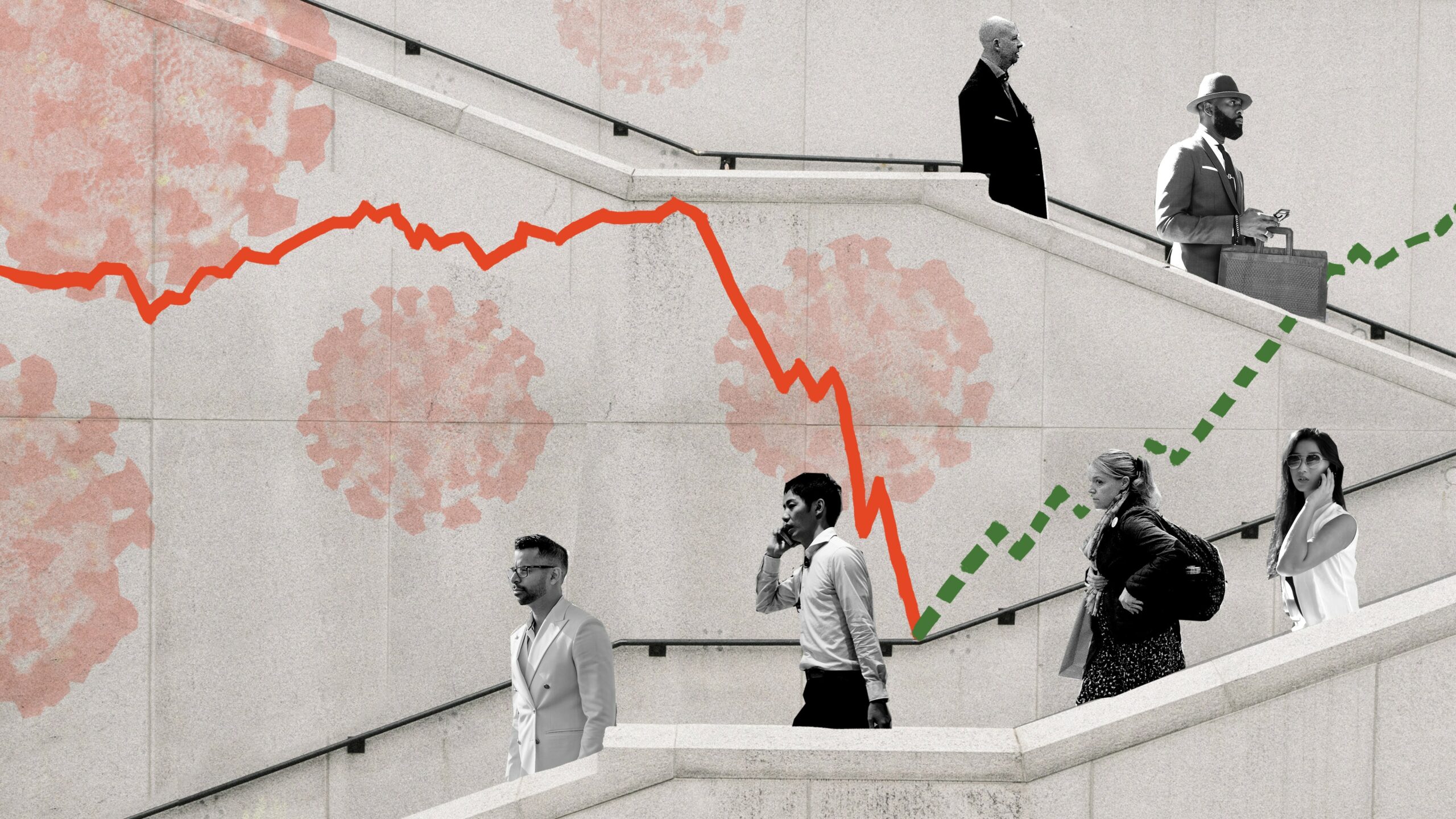Sandra Peter and Kai Riemer

Migration on Corona Business Insights
Labour migration: how COVID-19 has increased vulnerably, changed patterns of migration and the road to economic recovery.
As COVID-19 sets out to change the world forever, join Sandra Peter and Kai Riemer as they think about what’s to come in the future of business.
Shownotes
Without safe migration, economic recovery will be limited
Migration and COVID-19 via the Sydney Policy Lab
Protection of temporary migrants is now a ‘public health issue’
Big cities in India are dependent on migrant labour
COVID response leaves India’s migrant workers hanging
Australia temporarily suspends skilled migration program
Working holidaymakers can now extend their stay for up to 12 months
Thank you to Dr Stephen Clibborn, Associate Professor Chris F Wright, Dr Madhan Balasubramanian, Associate Professor Anna Boucher, Professor Stephanie Short, Professor Marc Stears, Professor Tim Soutphommasane, Professor Desmond King.
This episode is part of a podcast series covering what COVID-19 will mean for the business world, where we look at the impact on the economy, businesses, industries, workers and society. This is part of our ongoing coverage of the impact of COVID-19 on the future of business.
Follow the show on Apple Podcasts, Spotify, Overcast, Google Podcasts, Pocket Casts or wherever you get your podcasts. You can follow Sydney Business Insights on Flipboard, LinkedIn, Twitter and WeChat to keep updated with our latest insights.
Send us your news ideas to sbi@sydney.edu.au.
Dr Sandra Peter is the Director of Sydney Executive Plus and Associate Professor at the University of Sydney Business School. Her research and practice focuses on engaging with the future in productive ways, and the impact of emerging technologies on business and society.
Kai Riemer is Professor of Information Technology and Organisation, and Director of Sydney Executive Plus at the University of Sydney Business School. Kai's research interest is in Disruptive Technologies, Enterprise Social Media, Virtual Work, Collaborative Technologies and the Philosophy of Technology.
Share
We believe in open and honest access to knowledge.
We use a Creative Commons Attribution NoDerivatives licence for our articles and podcasts, so you can republish them for free, online or in print.
Transcript
This transcript is the product of an artificial intelligence - human collaboration. Any mistakes are the human's fault. (Just saying. Accurately yours, AI)
Intro From the University of Sydney Business School, this Sydney Business Insights.
Sandra And this is Corona Business Insights. I'm Sandra Peter.
Kai And I'm Kai Riemer.
Sandra And with everything that's happening, it's been difficult to understand what COVID-19 might mean for the business world. So in this series, we've been unpacking its impact on business, the economy, industry, government, workers and society and looking at the effects of the pandemic.
Kai And this podcast is, of course, part of a larger initiative by the University of Sydney Business School. Our COVID business impact dashboard is a living initiative which we constantly update with insights and resources from academics, from industry experts, Nobel Prize winners and movers and shakers.
Sandra And you can find all of these resources online at sbi.sydney.edu.au/coronavirus.
Kai And today we talk about the impact of the COVID-19 pandemic on migrants and migration.
Sandra And in particular, today, we're going to focus on worker migration. With border closures and a number of mobility restrictions within various nation states and across the world, there have been significant disruptions to the way workers can move around within countries and between countries. And in this episode, we're going to focus on highlighting three aspects in this conversation. One is around the vulnerability of these migrant communities. The second is around the patterns of migration. And the third one is going to be around the road to economic recovery.
Kai So migrant workers have been amongst the most vulnerable and the most hardest hit from the COVID-19 pandemic. And that is true for both the direct exposure to the virus, resulting from often precarious living conditions, as well as the economic fallout from the pandemic. So we've seen stories come out of places like Singapore where second wave COVID-19 outbreaks have been traced back to migrant worker dormitories, where a lot of people live in close proximity to each other in sometimes precarious living arrangements in conditions that easily spread the virus. And migrant workers are also often engaged in many of the essential services in societies around the world where they work out in the open or in contact with many people. We've seen lots of cases of COVID transmission in meatworks, in abattoirs not only in Australia but around the world. There's been cases in Germany recently where more than fifteen hundred workers of one company alone were infected not only because of the working conditions, but also because of the living conditions. Having raised for the first time public awareness and political awareness of this problem in Germany, with politicians publicly apologising that this should have been taken on as a significant issue much earlier, now highlighting and bringing to the fore some of those issues that migrant workers have faced pre COVID-19 but aggravated now with the pandemic.
Sandra And of course, it's not just working conditions, but also the precarious, often informal employment that these people are in, or the temporary nature of their employment, which further exposed them during the pandemic. In many countries, including in Australia, many of the government's measures have excluded temporary migrants from the Social Security measures that have helped people financially during the pandemic. And these exclusionary measures then have their further risk at pushing migrant workers to continue working while they were sick or indeed pushing them into the informal labour markets that can further expose them to harm.
Kai And, of course, in the case of international migration, where people were left unemployed, it might be in breach of their temporary visa conditions. Now being faced with the need to leave a country during a travel lockdown when no flights might be very expensive or not available at all, further pushing people into desperate situations where they don't have the means to sustain themselves again, leading them to engage in what is to work outside of the actual labour market.
Sandra And this indeed takes us to our second point, which highlights the patterns of migration. Given the border closures that we've seen between countries and within states. And that is to say, more than 50000 travel restrictions in over 200 countries. The mobility crisis has highlighted not only the inability of some people to leave the countries that we're in, but also to get back to other parts of the country. And this has been particularly visible in places like India, where a large part of the workforce travels significant distances to cities that can provide employment to people who have a little way of surviving in their villages where they're dependent on non-existent irrigation systems or dependent on the monsoon. Hence, they undertake significant journeys to be employed in large cities. However, given the pandemic and the high cost of living they now can't afford it and need to go back.
Kai And there's some stark numbers here in India. Migrant workers contribute about 50 percent to national income and they constitute nearly 30 per cent of its human capital based according to the Indian government's Economic Survey, in 2018/19. That's more than 400 million people in what is called India's informal economy. And so when, in May, Prime Minister Narendra Modi announced a national lockdown with just four hours' notice. Those people were basically left stranded, often living in overcrowded shanties where social distancing, handwashing is not really possible, and being all of a sudden unemployed. Millions of people took it upon themselves to migrate back to their country villages, in the process, not only exposing themselves to a harsh and exhausting journey, but also unnecessarily spreading the virus across the country, taking the virus into those rural villages, because there was no plans in place to look after migrant workers to provide them with the bare necessities to survive in the cities.
Sandra In Australia, of course, many temporary workers were caught off guard by the government's decision to lock down the borders. However, back in April, Australia actually decided to support this workers, many of whom are backpackers, by providing working holiday makers as well as the visa holders under the Seasonal Worker Programme and the Pacific Labour Scheme, with the opportunity to stay for another 12 months to work for certain approved employers, thus ensuring food security for Australia during the pandemic. And these are people who commit to working in critical industries such as food supply or health care, who were now allowed to extend their visa past the pandemic.
Kai Which brings us to our third point that we want to make, and that is the role of migrants in the economic recovery of countries around the world, especially in countries such as Australia, which have historically always relied on migration with borders closed, travel disrupted, and also skilled migration programmes put on hold during the pandemic. There's no real questions about an impending labour shortage in certain sectors. And we're not talking just high-skilled migration into things like education, information technology, professional services. We're also talking about migration into essential services such as healthcare, for example. But also into comparatively lower-skilled areas such as aged care, the abattoir workers we mentioned and all the kind of essential workers that were out and about during the pandemic.
Sandra So, what the pandemic has done is really shift a lot of the conversation around migrant workers to also highlight the importance of unskilled migration. A lot of the debate in countries like Australia, but also across Europe in recent years, has centred around the value of skilled migration. But the current crisis has, for many countries, highlighted the essential role of people who deliver food, who provide domestic care, who clean commercial and public spaces.
Kai And with the economy opening up, we all understand that cleaning services are in high demand like never before. So there's no questions about how migration around the world can be revitalised in order to be able to cope with a change employment profile in many countries. And we all understand that as the society starts opening up, we need certain kinds of labour like never before, such as cleaning services. And that is really shifting the conversation.
Sandra And we've seen that within a few weeks of the lockdown in places like Delhi or Mumbai, for instance, huge labour shortages were being reported that there was up to 15, 20 percent of the workforce having gone back to their respective provinces, something that is echoed in other parts of the world. For instance, in China, a rural migrant workers make up about 36 percent of China's total workforce. And the country's economy is dependent on these people being able to move around.
Kai And so the Chinese government understanding the importance of migrants for the process of economic recovery has since relaxed the so-called hukou restrictions that. Prevented migrant labourers from settling and buying houses in the cities that they work in to enable them to attract labour into areas that would benefit from more workers during the recovery process.
Sandra And this is a very big deal. The notion of hukou dates back to the time of Mao and to the Soviet Union, where the issuing of internal passports was used to ensure that individuals could be directed to specific locations where they had to live and work. And there were strict controls on the ability of people to move between regions. So this has been in place in China for a very long time. And due to the economic slowdown that slightly predates COVID-19, but of course, accentuated by the pandemic, President Xi Jinping put forward the free movement of labour as a necessary ingredient to economic growth. And this was followed shortly by the state council pledging to get rid of the hukou system for all but big cities like Beijing and Shanghai. As we start on the long road to economic recovery, it is clear that migrant labour, whether its skilled or unskilled, has a huge role to play in our ability to actually come out of this pandemic. However, the difficulty will lie in having this conversation alongside other important economic recovery conversations.
Kai And that, of course, means that we will have to have conversations about migration into certain sectors of the economy at the same time as we might see rampant unemployment in other sectors of the economy, which means that the political discourse has to separate populist arguments around, you know, keep jobs in the country vis-à-vis migration and has to make a more differentiated argument that outlines why Australia, even in the face of high unemployment, will have to reopen its borders to migration and not just high skilled migration.
Sandra And of course, this is a difficult conversation to have at the best of times. But for Australia, this does come down to preserving a rich history of a road to a more and more inclusive immigration system.
Kai And this is where we want to leave it. But we do want to take the time to thank the people who have contributed to this podcast through their insights provided to the Sydney Business Insights COVID dashboard, our colleague Stephen Clibborn and Chris F. Wright. And a wider circle of colleagues from the University brought together by the Sydney Policy Lab, including Dr Madhan Balasubramanian, Associate Professor Anna Boucher, Professor Stephanie Short.
Sandra Alongside Professor Desmond King at the University of Oxford and of course, the director of the Sydney Policy Lab, Professor Marc Stears and Professor Tim Soutphommasane.
Kai This has been Corona Business Insights.
Sandra Until next time. Thanks for listening.
Kai Thanks for listening.
Intro From the University of Sydney Business School, this is Sydney Business Insights, the podcast that explores the future of business.
Close transcript















